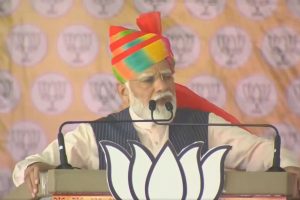On the face of it, Vladimir Putin has followed in the footsteps of the likes of Donald Trump, but the fine print of Russia’s decision to suspend participation in the nuclear arms treaty with the US must be that arms control has become ever so uncertain. In the net, the Big Powers on either side of the Atlantic have pulled out of the 1987 Intermediate-range Nuclear Forces (INF) treaty, which is due to expire this August unless there is an eleventh-hour effort to save the same. Thirty-two years after, it is hard not to wonder if the new Cold War is brewing again. Very different are the reasons why Washington ~ it pulled out in October 2018 ~ and Moscow have signalled their exit plans within a span of five months.
The outlook is awesome and ought to be a matter of riveting concern, more than Iran’s proposed nuclear proliferation. The only constraint that now remains on the US and Russian nuclear arsenals is the New Start Treaty (2010), an agreement that is also scheduled to expire in 2021. Even in terms of this nuclear pact, there appear to be differences between the Kremlin and White House. While Russia has let it be known that it is willing to extend New Start, the Trump administration is yet to firm up its stand, arguably not the least because the outcome of the 2020 election is already open to question. In the absence of the treaties of restraint, strategic stability can scarcely be assured.
Hence perhaps the rare public appearance in Washington of Russia’s ambassador to the US, Anatoly Antonov ~ “Today, I’m scared that some politicians and generals in Washington, and maybe in other capitals, start thinking about the possibility to be a winner in a nuclear war. I would like to use this opportunity to send a message that it is impossible to win a nuclear war.” It would not be wholly out of context to aver that in the aftermath of Pulwama and Balakot, Mr Antonov’s caveat must resonate in the echo chambers of the subcontinent.
Both Trump and Putin have unveiled plans to make significant upgrades to their nuclear arsenals. Small wonder that advocates of disarmament have warned about the dangers of returning to a costly and dangerous arms race once the treaties expire.
The provocation for the US withdrawal were allegations that a new Russian missile had violated the limits imposed by the INF treaty, which was signed after a nuclear standoff in Europe in the 1980s between US and Soviet medium-range missiles. While Moscow has denied the allegations, there are fears that much of European Russia and all of Europe would be within missile range of each other, if the burial of the INF leads to the deployment of new missiles on the continent.











